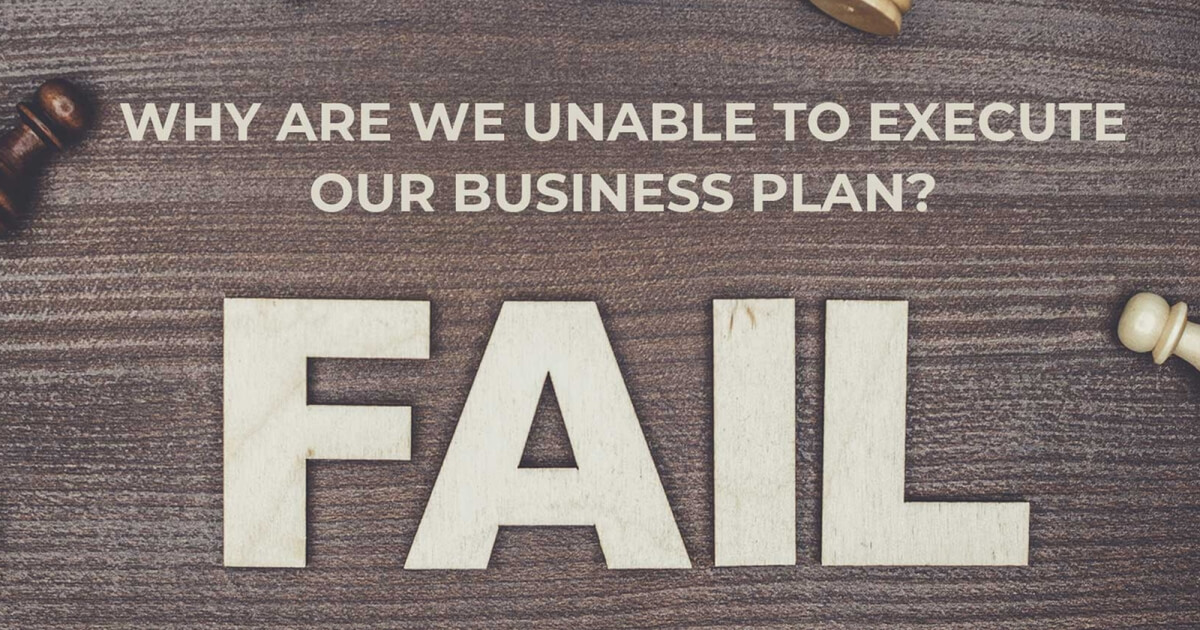
Why Are We Unable To Execute Our Business Plan?
Execution requires a Balance between An amazing plan/ Idea and the in-depth executable though.
The Devil Lies in Detail
When you have hit upon a great idea and decided to execute it through your entrepreneurial venture, the 5th mistake or obstacle that you now face is not going into the details. Remember however good your idea is, “The Devil Always Lies in Absolute Detail”. Execution lies in mastering the granular details. But when plans are made, we often leave out the minor details thinking that our determination to do and to get things done will automatically overcome those minor issues. Only to realise later that those minor issues were the real stumbling blocks.
The Mistake of Assumptions
I know of this brilliant person who decided to start her own venture after serving long enough at senior positions in the corporate world across the globe. Her idea was brilliant and her years of expertise lay in her execution skills. She was confident and many fund houses supported her confidence through their investments.
When she got down to starting her own venture, the issue that brought her down was her “assumed” supportive relationship with her family. Overall these years of her global life, she had failed to build her support blocks to take care of her personal, emotional and family needs. Her husband had been supporting her and the host of caretakers in the house along with her cousins and parents supported her all these years. But, when it came to starting on her own, she now needed to give more time to the business than ever before, and her assumptions that everyone will come around once again to support her like in the past, failed her!
She hadn’t realised that people had grown tired of supporting her and they also needed her time and support in return. She had failed to account for the fact that her loving and doting husband also needed her. That her now grown up Son had grown accustomed to not seeing her most of the time, that her parents and in-laws had grown old and no more capable to be the mother or wife she never was, while she had been busy all these years. Suddenly, she was hit with a loneliness that she had not accounted for.
Her motivation to carry on took a hit and despite her having sufficient resilience and strength, it started to die down in a few years as she did not have any support. Any number of new relationships, attention, fame and wealth were not giving her the motivation to go on. She had made the BIG Mistake of “assuming” that this one small matter of her family being there for her will not come true. Thus, never just “Assume”. Remember that your business plan needs to incorporate the minutest of details basis the real-time facts.
The 5 Types of Assumptions
Most intelligent planners make this mistake of Assumptions while preparing detailed execution plans. These common assumptive mistakes occur in the following 5 manners:
1.Attitudinal Assumptions
“He/ she has the correct and required attitudes to produce the desired outcomes” is a very common assumption we make as entrepreneurs. We make this assumption about others as well as ourselves. Sometimes this assumption is in a negative form where people assume “I/ He/ She can’t do something at all”. One may suffer from fears, habits or some memories that give them a negative perception about themselves and others. Those who make this mistake of being over optimistic or pessimistic (both are assumptions) about people’s attitudes, usually become a witness to unpleasant results.
Common success attitudes that help avoid this mistake are Team Collaboration, Team Leadership, Initiative (more than required), Constructive Participation, Attitude towards mistakes and Failures of self and others, Compassion, Inclusion, etc.
Remain real and remain grounded. You need to understand the truth and embrace it in place of becoming illusive.
2.Ability Assumptions
This is an assumption about people’s ability to do things or get things done. Capabilities of various people on a variety of tasks and skills vary. Due to the kind of work your people have displayed, sometimes successful at other times, not so successful, you make assumptions about their capabilities. When these assumptions prove right, you consider yourself intelligent, when they are proven wrong, suddenly it is not you, but the others who are now responsible?
Success is consciously produced when you assess your people’s capabilities in conjunction with them, else you make an assumption that may or may not prove itself. A risk you need not take.
3.Willingness Assumptions
I have witnessed corporates creating brilliant strategies for their future growth. While these strategies assume many aspects, one of the critical assumptions strategists make is that their people “want to actively participate in order to grow in their personal lives and professions”. While there is no doubt about the fact that everyone in this world wishes to grow, but an assumption that they want to grow and then to assume that they are willing to act to achieve their wishes can go horribly wrong. There is a big difference between wanting to wake up in the morning and Willingness to do so. People are happy to express their desires, they are also happy to talk about all the things necessary to fulfil those desires yet unwilling to do these things themselves.
Willingness is needed in each human and some examples of willingness are to think, to collaborate, to decide, to participate, to listen, to analyse, to sell, to produce, to improve, to learn, to support, to seek, etc.
While everyone knows that they need to listen to others, most people find this one of the toughest tasks. The culprit here is the ‘low willingness’ to listen. Having the intellect where one knows the need to listen or even a sharper intellect where one knows that they do not listen, yet they actually do not listen, is always a problem of willingness to listen.
4.Possibility Assumptions
While making plans, a common mistake made is of assumptions related to possibility. Most business plans talk about a particular demographic and their share of the demographic as a percentage. For example, there are 1.3 billion people in India, 20% (260 mil) of them are below 18 years old. Nearly 2% of them belong to the higher middle classes with annual income range of US$40,000 to US$60,000. They usually spend at least 1% of their annual income on this proposed product. The possible market size of 13 mil people with an average spend of US$400 to 600 makes it an attractive market. These kind of possibility calculations are the possibility assumptions. When these go wrong or different facts emerge, a lot of damage is done.
5.Experiential Assumptions
These set of assumptions are basis the previous tangible (Profits & Losses) and intangible (Pleasures & Pains) experiences we have had. Every new business plan gets affected by these experiential assumptions resulting in us becoming apprehensive and doubtful or at times overconfident of the expected outcomes. A mistake we live to regret.
This was the 5th of 10 mistakes an entrepreneur should avoid while scaling up!
Tune in every Monday to follow this series.
Here are the links to previous mistakes:
1. Lust: https://www.skc.world/your-lust-can-destroy-your-business/
2. Worrying instead of thinking: https://www.skc.world/if-you-worry-too-much-you-are-making-a-huge-mistake/
3. Entrepreneur not aligned with his people: https://www.skc.world/5-reasons-why-your-people-dont-listen-to-you/
4. Emotional Vulnerability: https://www.skc.world/your-low-emotional-consciousness-is-making-you-vulnerable/




